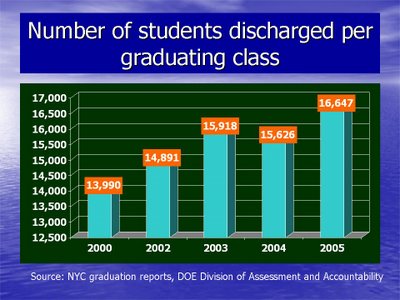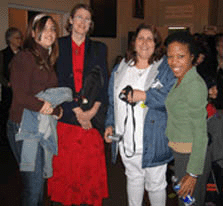
I received a great response to my last 2 columns where I compared the NYCDOE to totalitarian regimes.
I have not had time to make a similar comparison to the UFT, but last year’s contract battle and the “selling” of the current contract by the UFT cannot fail to make the point, as the Unity Caucus machine did everything it could to shut down the ability of people opposed to the machine to communicate with teachers.
One of the hallmarks of totalitarian regimes (my leftist friends should not take this as an attack on the concept of socialism) is total control of the communications network. Unity Caucus does everything within its power to make sure literature critical of them does not get to people, including pulling materials from mailboxes. Another tactic is to attack all critics personally instead of answering their objections.
Jeff Kaufman and James Eterno from ICE (Independent Community of Educators) have been attacked as “fear mongerers” for raising questions about whether health care is part of a quid quo pro as they have found language changes in the contract that indicate such a possible change. The UFT has denied that there is any change. Some have also asked if there was a deal to support continued mayoral control, which the UFT has denied. (Just watch what they do, not what they say.) A press release from the Mayor’s office indicated that parts of the contract were being paid for by “internal savings” by the UFT. Since then this comment had disappeared and the UFT is silent on it. Can you be paying for part of this contract yourselves? Who knows? But allowing the debate to go on can only help give people more info, But not in this union.
Unity bloggers have posted attacks on me on the blogs: ”I wouldn't trust ednotes. he is a venomous retiree who still beleives (sic) he is an in-service member. As a retiree, apparently you just want us in-service teacher to vote down a good contract because you hate Randi and that is all.”
Someone responded: “Why can't a retired teacher put stuff in mailboxes? Isn't it good to hear views from all sides?”
Their frightening answer:
“When the DA approves something it is official union policy. When someone (ICE and Norm) put out something against official union policy, it seems to undermine the idea of democracy and the voice of over 1400 schools. As for teacher mailboxes, if you're retired, you shouldn't be putting anything, on any subject, in the mailboxes.”
(Apparently, RETIREE to Unity is a dirty word; unless they happen to be the over 50,000 retirees that vote in UFT elections and the 300 Unity retirees at the Delegate Assembly.)
Like I said: totalitarian tendencies at the DOE and the UFT.
I responded:
1. Do the masses of people working at the union, almost all making over 100 grand and some approaching 200 grand after the new raises go into effect, have to "live" under the contract? Are they "in-service?" Don't they get the same raises as the in-service teachers without any of the consequences? Don't they have a much greater incentive to sell the contract? Yet, they go all over putting stuff in mailboxes including Dist reps who put Unity material in the boxes. Of course that is ok since they are union officials.
2. The attacks on my right as a retiree to disseminate info as a service to ICE because the overwhelming majority of ICE people are in-service is designed to obscure the fact that ICE retirees afford the people critical of Unity a major opportunity to get info out to people. We are delivery people but Unity wants to use that as an obfuscation to keep the info out of people's hands. Next they'll tell me that it is wrong for me to go to the post office during the day to mail out flyers or I shouldn’t write a column critical of the contract.
Unity Caucus hounds are in effect saying that after Congress passes something the press and the opposition party should have no right to disseminate information opposing it. They certainly encouraged the Democrats to challenge Bush. But when it comes to challenging themselves they hold different views. I always thought democracy included the right of people not in the majority to disagree.
Just a short time ago, almost everyone supported the war in Iraq. If more voices of the minority had been heard then, results might have been different.
The press and public, and the UFT initially, supported the BloomKlein agenda but now as information leaks out there is a turning of the worm on mayoral control (except for the UFT as you will see in my column.) (Wasn’t Bloomberg elected by a majority? Then just shut up!)
Jumping on popular bandwagons is not a healthy thing and others and I insist on resisting the tide. On this contract, given the history of UFT leaders, it is absolutely necessary to raise issues. Already, based on our questions on the health issues, the UFT has been forced to put out more information in response. Whether we are proven right or wrong, we have provided a service.
Photo courtesy of: www.lewrockwell.com/www.lewrockwell.com/ What Lurks Beneathby Norman Scott
There were cries of joy in Mudville as teachers heard about the wonderful new contract negotiated between Randi Weingarten and Mayor Bloomberg. Having wrung just about every concession they could out of teachers and realizing that one more giveback might lead to open revolt in the UFT, the Mayor and Weingarten decided to beat a hasty retreat and follow the pattern set by DC 37 to provide a raise that will just about cover the rise in cost of living. (The Consumer Price Index (CPI), which measures inflation, has risen 5.2% in the first nine months of the year in the NYC metropolitan region.)
The contract, in effect an endorsement by the Mayor of Weingarten in the upcoming UFT elections this spring, will include a $750 bonus to be paid just as the election campaign kicks off this January. Rumors that the money will be included with a big picture of Weingarten in the election ballot envelope have not yet been confirmed.
Why would the Mayor and his trusty sidekick Robin - er - Joel Klein, want to see Weingarten’s position with her members strengthened? Haven’t they been fighting all these years? Well, if you believe that, I still have a couple of bridges available for sale.
With the city flush (in the fiscal year that ended in June, the city had a budget surplus of $3.5 billion after predicting at the start of the year that there would be a shortfall of over $7 billion) and the mayor hungry for support for institutionalizing control of the school system by mayors for the next 1000 years, Bloomberg seemed ripe for picking a few bucks out of his pocket.
Some teachers were saying that here was an opportunity to get more than the COLA and also get back a few of the enormous givebacks from the last contract. How many givebacks? If you’re involved in a school, you know. Just listing them makes me tired.
I met a teacher at an Election day workshop who said a large group of teachers came into school on the days before Labor Day wearing tee-shirts that said “Don’t blame me, I voted NO.”
“I hate the 37 minutes,” said a former teaching fellow who had come to teaching from the business world. A math teacher who has to teach language arts, during those times, she finds those minutes the most draining of the week and just can’t give another late day to doing the after school activities with kids that she did BSC (Before Sucky Contract).
Parents too were hoping for some relief as one commented, “It’s good they got a contract, as long as they got rid of that ridiculous 37 minutes.” So sorry.
Many parent groups who have been marginalized by the Mayor’s total control of the schools have been gearing up to oppose the renewal of the school governance law when it sunsets in 2009, hoping for the UFT to join in this effort. Sorry again. Won’t happen, except for some mouthings of support.
The NY Post proclaimed "No Secret Deal in Teacher Pact" proclaimed. “On the heels of a historic new contract with the city, the head of the teachers union yesterday dismissed speculation that the deal committed her to supporting extending mayoral control of the school system. Saying she has been bombarded with questions from members and outside observers about striking a ‘secret deal’ with Mayor Bloomberg, United Federation of Teachers President Randi Weingarten said there was no backroom pact. ‘There was no secret deal about anything,’ Weingarten said. ‘The mayor and I did not have a conversation about mayoral control.’"
Watch what the UFT does, not what it says. Actions are judged by outcomes and the outcome will be a renewal of mayoral control with some minor tinkering. The UFT will sit on the sidelines and use none of whatever pull it has to make changes in governance that would give teachers and parents a real say. Of course, the UFT will make noises about tinkering with the process and do whatever PR they think is necessary to mollify members who are outraged at the negative impact mayoral control of the schools has had on working conditions - the total refusal to deal with class size, the total and rigid control of what goes on in the classroom, the total lack of respect for the opinions and experience of teachers, etc. We might even see some bogus committees set up that will still allow principals to subvert them to their ends.
The UFT will make some noises about allying with parents who have been shut out of the process by BloomKlein. But the UFT will continue to turn its back on the corruption that is in many ways so much worse than anything that took place under the old system and will use as their argument "We don't want to go back to THAT! “ THAT" means community control. Yet, even under the old system, high schools were centrally mismanaged so much worse than many of the local districts. Would anyone argue that the high schools, and now, the rest of the system, are better managed today after the entire system was put through such an upheaval?
Rush to judgment?My colleagues in the Independent Community of Educators (ICE) were amongst the few people at the negotiating committee, the Executive Board and the Delegate Assembly who voted NO, warning people to “Beware the Ides of November” as the tentative contract was rushed through all three of these bodies within 48 hours, allowing few delegates the time to consult with their colleagues in school or to take a hard look at the details of the contract or get answers to the numerous questions it raises.
People in the schools were immediately inundated by a blitzkrieg from the union raving about the wonders of the new contract. Suspicions were raised because the new contract wouldn’t go into effect for almost a year before the current contract expires. “What’s the rush?” was the question as some chapter leaders were saying they were confused. Don’t worry - the UFT leadership will explain it.
As ICE was pointing these things out, there was an hysterical outcry by the attack dogs from Weingarten’s Unity Caucus, accusing the ICE’ers of fear-mongering when ICE hinted there might be hidden health plan givebacks as a side deal since Bloomberg had proclaimed that pensions and health givebacks were the next line of attack against the unions.
Jeff Kaufman, a former lawyer and one of 3 ICE reps on the UFT Executive Board (Unity has 83), claimed that health issues had been pulled from the new contract and would be negotiated separately on a city-wide level without giving UFT members a vote, a charge denied by UFT leaders who claimed things had always been done that way. Kaufman discovered some interesting language changes in the new contract:
2002 Contract Section 5-Health Insurance and Welfare FundThe Health Benefits Agreement, dated January 11, 2001, is deemed to be part of this Agreement. Pursuant to those Agreements, the parties have agreed to a series of payments to the Welfare Fund.
2005 Contract Section 5-Health Insurance and Welfare FundThe Health Benefits Agreement, dated July 22, 2005, is deemed to be part of this Agreement. The side letter agreements, dated June 30, 2004 and July 13, 2005, are deemed to be part of this Agreement.
Kaufman wrote, “Now look at the change in language on health insurance from the new Agreement which has been split into two sections.”
2007 Agreement- Section 5 Welfare Funds(This section describes Welfare Fund Improvements paid for according to the Department of Education with "UFT generated internal funding."
“What does UFT generated internal funding mean,” Kaufman asked?
2007 Agreement- Section 17 Continuation of Certain Health Benefits"The parties acknowledge that collective bargaining regarding health benefits is within the purview of negotiations between the Municipal Labor Committee and the City. Cost-containment initiatives and program modifications in the City Health Benefits program shall be discussed with the Municipal Labor Committee."
The words
“are deemed to be part of this Agreement” are no longer there.
No matter what the people opposed to the new contract manage to dig up, it is expected to pass overwhelmingly, with the opposition getting a much smaller vote than the 40% opposed to the contract a year ago. People have basically given up on the UFT’s ability to win back any of the concessions from the last contract. In the schools, there’s a sense that the union has little ability to protect them, so why not take the money and run? A minority will vote NO based on the perception that even if no concessions would be wrung from BloomKlein in the next few years, what is needed is a fighting, militant union that will prepare the ground for struggles against future mayors. The UFT holds out the carrot that they will do better with a mayor they help elect.
James Eterno, chapter leader from Jamaica HS and an Executive Board member (ICE) commented on a blog:
“The people who are waiting for Mayor Nirvana to lead us to the promised land are fooling themselves. Back when Koch was Mayor when I started, the UFT said that he called us part time employees so we can't work with him. Then we endorsed David Dinkins and a few years later we were wearing ‘Shame on City Hall’ shirts. We wouldn't endorse his re-election but when Rudy Giuliani was elected, Sandi Feldman said he was the toughest Mayor ever. Then it was Bloomberg and Klein and they were worse according to the UFT. It doesn't matter who the next Mayor is; the UFT will still be unable beat the pattern that DC 37 will set which will be less than inflation again probably. Three more years of this and nobody will remember how teachers used to have rights.”
From The Wave, published November 17, 2006
 The UFT leadership quickly cobbled together a resolution on mayoral control at the Dec. 4, 2006 Exec. Bd. meeting after the ICE resolution calling for the UFT to call for the end of mayoral control was emailed to Randi Weingarten by an ICE member asking for speaking time to present the motion at the Dec. 6 DA. That these people spend so much time worrying about what teeny tiny ICE is doing is beyond bizarre. And watching the machinations of Weingarten to try to paint ICE as being the ones not being democratic is truly a special treat - definitely better than some of those stale cookies at the meeting. Randi is trying to make it look like Ed Notes and ICE just came up with the idea of putting forth a resolution on mayoral control in respone to a Unity plan to create another task force - the usual method politicians use to stall an issue. In researching an article the Dec. paper edition of Ed. Notes I went back into the dusty -- cough, cough – archives and dug up some oldies but goodies. I had been writing about the negative impact of mayoral control on school systems around the nation in Ed. Notes in the monthly editions handed out at the Delegate Assembly since 2001. When Ed Notes expanded to a 16 page tabloid in the fall of 2002, the first edition (with a circulation of 12,000) had the following article on the front page.
The UFT leadership quickly cobbled together a resolution on mayoral control at the Dec. 4, 2006 Exec. Bd. meeting after the ICE resolution calling for the UFT to call for the end of mayoral control was emailed to Randi Weingarten by an ICE member asking for speaking time to present the motion at the Dec. 6 DA. That these people spend so much time worrying about what teeny tiny ICE is doing is beyond bizarre. And watching the machinations of Weingarten to try to paint ICE as being the ones not being democratic is truly a special treat - definitely better than some of those stale cookies at the meeting. Randi is trying to make it look like Ed Notes and ICE just came up with the idea of putting forth a resolution on mayoral control in respone to a Unity plan to create another task force - the usual method politicians use to stall an issue. In researching an article the Dec. paper edition of Ed. Notes I went back into the dusty -- cough, cough – archives and dug up some oldies but goodies. I had been writing about the negative impact of mayoral control on school systems around the nation in Ed. Notes in the monthly editions handed out at the Delegate Assembly since 2001. When Ed Notes expanded to a 16 page tabloid in the fall of 2002, the first edition (with a circulation of 12,000) had the following article on the front page.











